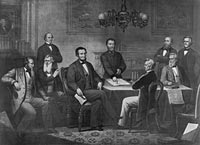On November 11, 1864, President Lincoln was reelected with the Electoral College support of all but New Jersey and Delaware. The prospects for his reelection had fluctuated wildly during 1864. Early in the year, supporters of Salmon Chase had tried unsuccessfully to wrest the nomination from Abraham Lincoln. Later, disgruntled opponents of the President’s war policies launched a third party candidacy for John Frémont. Although Abraham Lincoln’s own “Union” nomination went surprisingly smoothly in June, Republican leaders grew agitated in July and August when the Union Army stalled in front of Richmond after a series of bloody battles and the President rejected both Radical views on reconstruction and moderate efforts to start peace negotiations. By late August, many Republican leaders were overcome by political paranoia and looked around desperately to replace Mr. Lincoln with another presidential candidate. When his political prospects were bleakest on August 23, President Lincoln considered what he might do if he indeed lost. The President had all of the members of his cabinet sign the outside of a sealed document.
John Hay recorded in his diary the events of a cabinet meeting on November 11, 1864: “At the meeting of the Cabinet today, the President took out a paper from his desk and said, “Gentlemen, do you remember last summer I asked you all to sign your names to the back of a paper of which I did not show you the inside? This is it. Now, Mr. Hay, see if you can get this open without tearing it!” He has pasted it up in so singular style that it required some cutting to get it open.” It read: “This morning, as for some days past, it seems exceedingly probable that this Administration will not be re-elected. Then it will be my duty to so co-operate with the President elect, as to save the Union between the election and the inauguration; as he will have secured his election on such ground that he can not possibly save it afterwards.” 1 Among those who had impressed on him his electoral difficulties in the days immediately preceding the note were New York State editor-politicians Thurlow Weed and Henry Raymond. They were relatively conservative compared to other New York City editors like Horace Greeley and William Cullen Bryant who were close to active efforts to find a substitute for President Lincoln.
When he revealed the contents of the note, the President said, ‘You will remember that this was written at a time (6 days before the Chicago nominating Convention) when as yet we had no adversary, and seemed to have no friends. I then solemnly resolved on the course of action indicated above. I resolved, in case of the election of General McClellan, being certain that he would be the candidate, that I would see him and talk matters over with him. I would say, ‘General, the election has demonstrated that you are stronger, have more influence with the American people than I. Now let us together, you with your influence and I with all the executive power of the Government, try to save the country. You raise as many troops as you possibly can for this final trial, and I will devote all my energies to assisting and finishing the war.'” According John Hay, “Seward said, ‘And the General would answer you, ‘Yes, Yes;’ and the next day when you saw him again and pressed these views upon him, he would say, ‘Yes, Yes;’ & so on forever, and would have done nothing at all.’ “At least,’ added Lincoln, ‘I should have done my duty and have stood clear before my own conscience.”2
“If McClellan had won, it would have changed the course of history,” noted historian David E. Long. “Two questions were of surpassing importance in 1864, and both were resolved by Lincoln’s reelection. First, would the Union have been restored had McClellan won? Stated otherwise, would McClellan have prosecuted the war to the successful conclusion? Or, alternatively, would Lincoln have gained the unconditional surrender of the Confederacy during his lame-duck period from November 8, 1864 to March 4, 1865? Second, would emancipation have survived Lincoln’s defeat? Would slavery have ended permanently in the United States within a year of the end of the war had McClellan been elected?”3
Footnotes
- Michael Burlingame and John R. Turner Ettlinger, editors, Inside Lincoln’s White House: The Complete Civil War Diary of John Hay, p. 247.
- Burlingame and Ettlinger, Inside Lincoln’s White House: The complete Civil War Diary of John Hay, p. 248.
- David E. Long, The Jewel of Liberty, p. 265.








